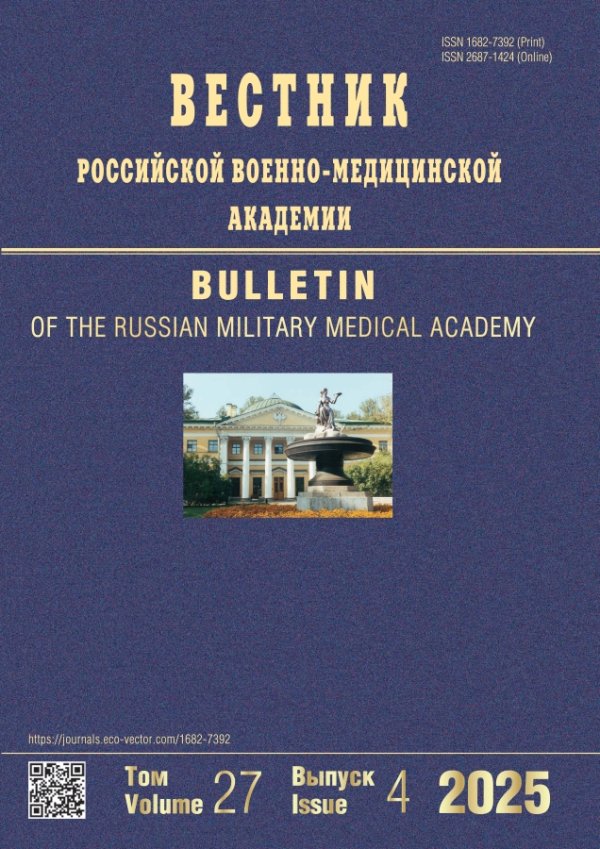The effect of a systemic inflammatory response on adaptive mechanisms and the state of homeostasis in patients with respiratory tuberculosis in combination with chronic obstructive pulmonary disease
- Authors: Кaticheva A.V.1, Brazhenko N.A.2, Brazhenko O.N.2, Chuikova A.G.2, Nikolay A.V.3, Zheleznyak S.G.4, Tsygan N.V.4
-
Affiliations:
- Первый Санкт-Петербургский государственный медицинский университет им. акад. И.П. Павлова
- Первый Санкт-Петербургский государственный медицинский университет им. акад. И.П. Павлова
- Пушкинский противотуберкулезный диспансер
- Military medical academy of S.M. Kirov
- Issue: Vol 22, No 4 (2020)
- Pages: 23-27
- Section: Clinical trials
- URL: https://journals.rcsi.science/1682-7392/article/view/62799
- DOI: https://doi.org/10.17816/brmma62799
- ID: 62799
Cite item
Abstract
The influence of the systemic inflammatory response on the adaptive mechanisms and the state of homeostasis of the body in patients with respiratory tuberculosis against the background of chronic obstructive pulmonary disease is considered. It has been established that respiratory tuberculosis and chronic obstructive pulmonary disease are widespread among the population and are important causes of bronchopulmonary morbidity and mortality. Chronic obstructive pulmonary disease is determined in one third of newly diagnosed patients with respiratory tuberculosis. The combined course of respiratory tuberculosis and chronic obstructive pulmonary disease is a mutually aggravating condition. Comorbid pathology is much more difficult, accompanied by severe intoxication, disintegration of lung tissue and bacterial excretion. Biomarkers and the severity of the systemic inflammatory response are of great clinical and diagnostic value in chronic obstructive pulmonary disease. It was determined that the systemic inflammatory response in chronic obstructive pulmonary disease is characterized by endothelial dysfunction of the vascular wall, significant changes in white blood cells, changes in the protein spectrum of the blood, and lipid metabolism disorders. The manifestations of systemic inflammation and endothelial dysfunction, characteristic of chronic obstructive pulmonary disease, in patients with respiratory tuberculosis, aggravate the course of both diseases. The comorbid state is also characterized by a change in the lipid profile of patients, an increase in the content of total cholesterol and atherogenic fractions. These changes are interrelated with the state of adaptive mechanisms, homeostasis and reactivity of the organism. The state of homeostasis largely determines the development, course and outcome of pathological processes characteristic of tuberculous inflammation and inflammation in chronic obstructive pulmonary disease, and the increase in the effectiveness of the treatment is closely related to the restoration of homeostatic balance and reactivity of the body. The availability of methods for determining the homeostatic balance of the body in clinical practice, with their high information content, allows a personalized approach to the management of patients with comorbidity.
Full Text
##article.viewOnOriginalSite##About the authors
A. V. Кaticheva
Первый Санкт-Петербургский государственный медицинский университет им. акад. И.П. Павлова
Author for correspondence.
Email: an.kati4eva@mail.ru
Russian Federation, Санкт-Петербург
N. A. Brazhenko
Первый Санкт-Петербургский государственный медицинский университет им. акад. И.П. Павлова
Email: an.kati4eva@mail.ru
Russian Federation, Санкт-Петербург
O. N. Brazhenko
Первый Санкт-Петербургский государственный медицинский университет им. акад. И.П. Павлова
Email: an.kati4eva@mail.ru
Russian Federation, Санкт-Петербург
A. G. Chuikova
Первый Санкт-Петербургский государственный медицинский университет им. акад. И.П. Павлова
Email: an.kati4eva@mail.ru
Russian Federation, Санкт-Петербург
A. V. Nikolay
Пушкинский противотуберкулезный диспансер
Email: an.kati4eva@mail.ru
Russian Federation, Пушкин
S. G. Zheleznyak
Military medical academy of S.M. Kirov
Email: an.kati4eva@mail.ru
Russian Federation, Saint Petersburg
N. V. Tsygan
Military medical academy of S.M. Kirov
Email: an.kati4eva@mail.ru
Russian Federation, Saint Petersburg
References









